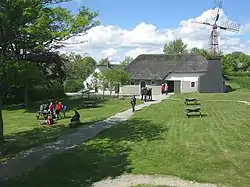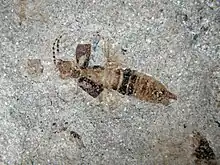Fur Museum
The Fur Museum is a nationally recognized local natural history museum in Denmark.[2] The museum is named after the Danish island Fur on which it is located. When the museum was founded in 1954, the focus was on the local history of the island. In 1957, the leader of Fur Museum found the fossil of a big leatherback turtle,[3] and the focus of the museum shifted towards geology and natural history.
 | |
| Established | December 4, 1954 |
|---|---|
| Visitors | 34.877 in 2015[1] |
| Website | www |
Today Fur Museum combines exhibitions on the natural history, geology and environment of the island, with an exploration of its cultural and social history. The Museum is located in the village of Nederby, not far from the ferry port, in the south of the island named Fur, Denmark. The museum is administered as a part of Museum Salling.
Fossils
The museum has a large and diverse collection of early Eocene (55 million years old) fossils collected locally on the island in the "moler" landscape - the Danish name for the Fur Formation - and the underlying Stolle Klint Clay. The collection includes fossils of insects,[4] birds, fishes,[5] reptails, and land plants.
 Fish on display, with the center exhibit showing a fossil and a model of a tarpon
Fish on display, with the center exhibit showing a fossil and a model of a tarpon Antigonia boarfish
Antigonia boarfish Polymixiid fish
Polymixiid fish Man looking at fossil fly, with an enlarged photo of the specimen in the background
Man looking at fossil fly, with an enlarged photo of the specimen in the background Unidentified fish
Unidentified fish Forficula paleocaenica earwig
Forficula paleocaenica earwig Cimbrophlebia bittaciformis scorpion fly (Mecoptera)
Cimbrophlebia bittaciformis scorpion fly (Mecoptera) Scombrid fossils and model
Scombrid fossils and model
 unidentified fly (Diptera)
unidentified fly (Diptera)
Sources
- "Museer". Dst.dk. Retrieved 1 February 2018.
- Lindow, Bent (25 January 2016). "Danekræ fossil trove". Snm.ku.dk. Retrieved 1 February 2018.
- EIGIL NIELSEN. "On the post-cranial skeleton of Eosphargis breineri" (PDF). 2dgf.dk. Retrieved 1 February 2018.
- LARSSON, S.G. (1975). "Palaeobiology and mode of burial of the insects of the Lower Eocene Mo-clay of Denmark" (PDF). Bulletin of the Geological Society of Denmark. 24: 193–209. Retrieved 1 February 2018.
- Pedersen, G.K.; et al. (2012). "Molerområdets geologi – sedimenter, fossiler, askelag og glacialtektonik" (PDF). Geologisk Tidsskrift (in Danish): 41–135. Retrieved 1 February 2018.